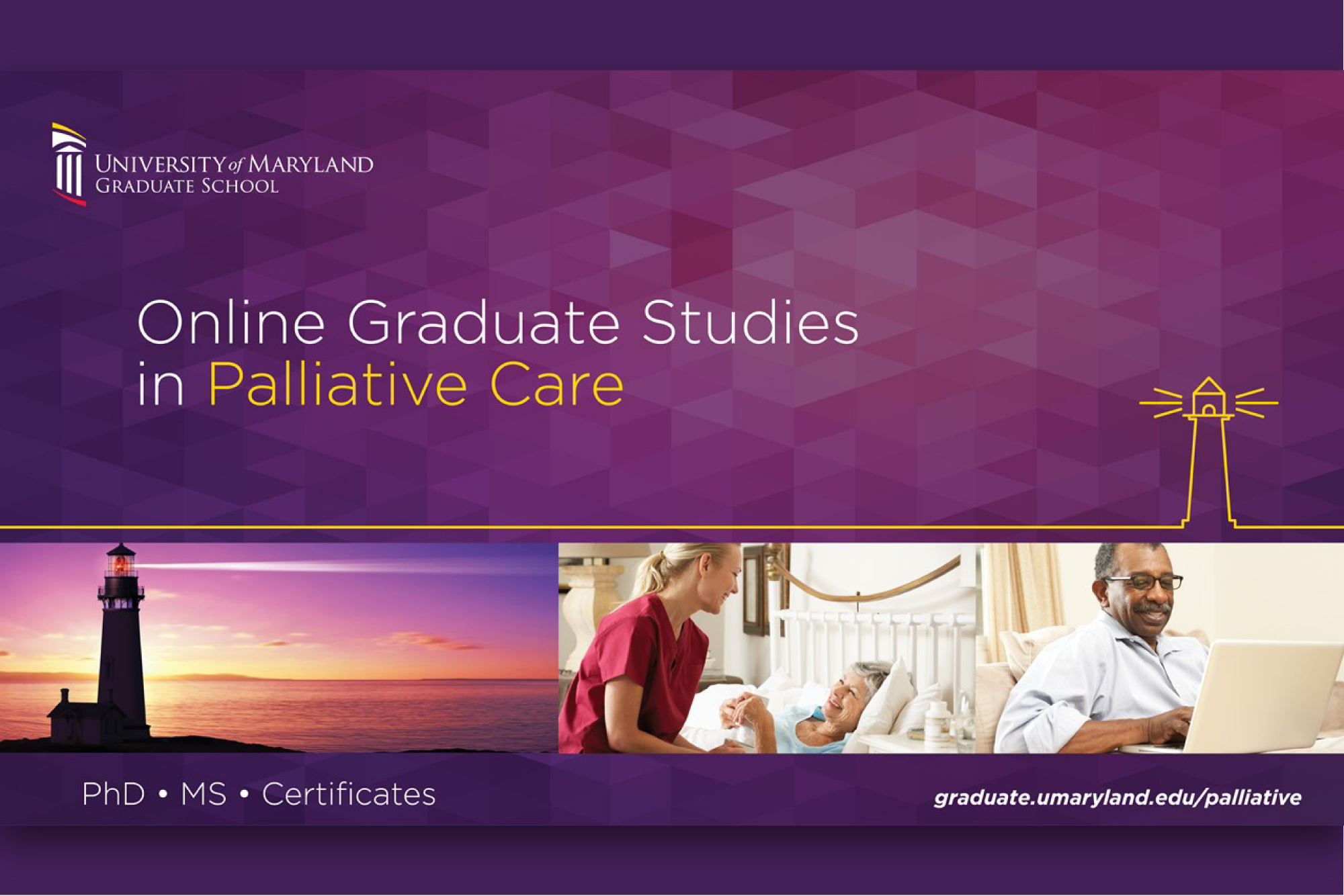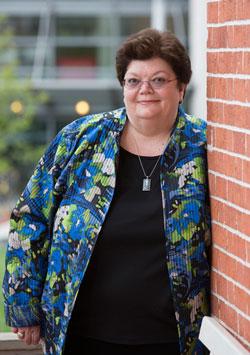2012 Teacher of the Year
Mary Lynn McPherson turns pain into smiles. As professor and vice chair of academic affairs at the School of Pharmacy, McPherson does this for students, patients, and faculty colleagues.
By Chris Zang
October 21, 2012
Mary Lynn McPherson turns pain into smiles. As professor and vice chair of academic affairs at the School of Pharmacy, McPherson does this for students, patients, and faculty colleagues.
An international expert in the field of palliative care and pain management, McPherson has developed courses and clinical experiences in end-of-life care management that students enter with anxiety and trepidation. But they don’t stay that way for long, says McPherson’s 20-year pharmacy colleague David Roffman, PharmD, BCPS/Cardiology, himself a former University Teacher of the Year.
“Dr. McPherson has the ability to quickly put them at ease, and demonstrate the skills that will ultimately allow the student to perform their tasks objectively and with empathy.”
Patients, whom she sees in her practice as director of pharmacotherapy services at UniversityCare Heritage Crossing, and patients and families coping with end-of-life issues, who see McPherson at her many speaking engagements, also leave her with their spirits lifted.
Faculty and research partners across several disciplines also appreciate her counsel. “Dr. McPherson is the embodiment of interprofessional collaboration,” says Sandra McLeskey, RN, PhD, professor at the School of Nursing.
McPherson, who in addition to managing 20 courses has organized symposia and a Teaching Excellence Day for faculty, says being a team player comes naturally. “The power of a team approach far exceeds the sum of the parts,” she says. “This is true of teaching, practice, and research.”
Along with co-director Sharon Gordon, DDS, MPH, PhD, director of graduate research education at the School of Dentistry, McPherson was recently awarded a Center of Excellence in Pain Education grant from the National Institutes of Health. She developed the first nationally recognized Palliative Care Residency by the American Society of Health-System Pharmacists.
“I think the part of hospice and palliative care that touches me most is that this field is the model for interprofessional collaboration,” says McPherson. “Everyone on the team [which includes the patient and family] is important and we all have a common goal. I tell my hospice nurses they are 10 percent pharmacist after I get done with them!”
In addition to the schools of pharmacy, nursing, and dentistry, she also has had an impact on the School of Medicine, lecturing on pain management in the Department of Physical Therapy.
“She consistently demonstrates a highly effective teaching style that is applicable over a wide spectrum of medical disciplines,” says Douglas Ross, MD, PhD, FACP, professor in the medical school. “In many respects, her lectures, books, and publications have put UMB ‘on the map’ as a center of excellence in pain management and palliative care symptom control.”
Regardless of the discipline, McPherson brings enthusiasm to the task.
“As the vice chair for education, Dr, McPherson meets with faculty members in our department to review their course evaluations at the end of each semester,” says Kristin Watson, PharmD, residency program coordinator. “After each meeting with Dr. McPherson, I have left her office excited and eager to integrate her suggestions into my teaching.”
McPherson says it’s the other way around. The younger faculty and students energize her. “They inspire me!” McPherson says. “I am so proud of the students from our School of Pharmacy—they really are the best in the world.”
The students and residents feel that way about McPherson. One course evaluation said, “Dr, McPherson should teach ALL the courses.”
Managed care resident Kathy Ghomeshi, PharmD, says, “Dr. McPherson has a very dynamic teaching style that beckons students to actively participate in lectures, discussions, and scenarios that apply the information. She even hosted live interactive lab sessions where students learned proper techniques for administering insulin and properly fitting patients for assistive devices, such as canes and walkers. Her multi-faceted approach really enhanced my learning.”
Adds former resident Leah Sera, PharmD, “No matter the education level of the audience, Dr. McPherson teaches in a way that engages learners in the material. I am in awe at the lines that form after her presentations of people who want to speak to her personally, pick her brain. I have tried to emulate her because I have seen how successful she is as an educator.”
McPherson is one of the few program directors whose residents consistently publish and/or present their work at national pharmacy and multidisciplinary conferences. Many have become leaders in the profession. McPherson prides herself on maintaining relationships with many of her former students.
“She has had a sustained positive impact on her students, residents, and colleagues,” says School of Pharmacy Dean Natalie D. Eddington, PhD, FAAPS, FCP, who received 30 letters supporting McPherson as Teacher of the Year. “She clearly epitomizes the gifted, committed, and exceptional teacher that has instilled the lifelong learner concept into her students.”
When Nikunj Patel, PharmD ’12, confronted the death of a 9-year-old nephew, he remembered McPherson’s Care of the Terminally Ill class. “We learned everything from planning a funeral to helping family members cope with grief,” Patel says. “Her teaching proved to be a constant source of guidance during such a tough time.”
Adds Michael LaPenta, MD, chief medical officer for Hospice of the Chesapeake, “She models how to be an integral member of the hospice team and mentors these learners on how to provide exemplary patient care to this fragile population.”
McPherson does this by using anecdotes from her 20 years of teaching and four years of hospice work before that. She easily shifts from one teaching methodology to another. Some aren’t the most conventional.
McLeskey recalls a pathopharmacology nursing course that was covering the autonomic nervous system, an “essential but rather dry” subject, she says. McPherson livened it up, devising an autonomic nervous system Jeopardy game in PowerPoint. “Students were divided up into five teams and competed as contestants do on the TV show,” McLeskey recalls. “This exercise was always greeted with great enthusiasm, cheering, and laughter, enabling students to learn while having fun.“
McPherson says: “I think active learning is the best way to help students apply and retain information. If we can have fun while enhancing learning—it’s a win/win all around.”
Such an approach also has endeared her to groups like the Hospice and Palliative Nurses Association (HPNA) and the American Society of Health-System Pharmacists Foundation (ASHP).
“She has presented at over 60 ASHP and ASHP-related meetings over the last 20 years,” says Daniel Cobaugh, PharmD, DABAT, FAACT, vice president of the ASHP. “Dr. McPherson always attracts a large audience. On a personal note, I have had the opportunity to observe her passion for ensuring that patients with pain and those with palliative care needs receive safe and effective care.”
Judy Lentz, RN, MSN, NHA, the HPNA’s retiring CEO, says McPherson’s presentations attract comments like “best speaker ever,” “learned so much” and “I could listen to her all day.”
The HPNA will soon add its Presidential Citation to McPherson’s many honors. The award is noteworthy, says Andrew Coop, PhD, chair of the Department of Pharmaceutical Sciences at the School of Pharmacy.
“I single this out as it is an award from a nursing association given to a pharmacist,” Coop says. “This clearly demonstrates her commitment to interdisciplinary education and practice. With all the honors, achievements, publications, and presentations, Dr. McPherson never forgets that it is the growth of the individual student that is the essential component of education.”
“She has consistently earned the highest scores in the department and perhaps the entire School of Pharmacy for many years,” says Magaly Rodriguez de Bittner, PharmD, CDE, chair of McPherson’s Department of Pharmacy Practice and Science. “Not only is she knowledgeable and impactful but she also a very effective teacher. She has touched the lives of most of the pharmacists in the state.”
R. Gary Hollenbeck, PhD, chief scientific officer at UPM Pharmaceuticals, also supported McPherson for Teacher of the Year, which he won in 2002. “It would be hard to envision a more complete portfolio of activity, innovation, and achievement than presented by Lynn,” he says. “She has been a trailblazer and I believe no one in pharmacy education can match her record for multidisciplinary course and curriculum development.”



